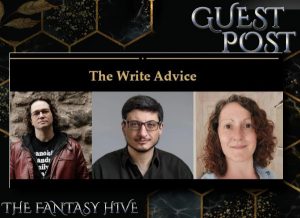THE WRITE ADVICE – 4 Common Mistakes in Query Packages

We’re thrilled to welcome The Write Advice team, Justin Lee Anderson, Stephen Aryan, and Anna Stephens, to the Hive. Throughout June, they’ll be joining us weekly with their expert writing advice.
The Write Advice (www.thewriteadvice.co.uk) are a group of seasoned authors that provide support for writers on the path to publication. They focus on mentoring, guidance, editing, and feedback on submission packages.
This week, Stephen Aryan shares some common mistakes that writers have been making with their query letters and sample chapters.
4 Common Mistakes in Query Packages
1. Repetition
Quite often what I see is someone using the same word twice in close proximity. This could be two or even three times in one sentence, or it could be the same word in several consecutive sentences. Sometimes one sentence ends with a particular word and then the next sentence starts with the same word. I think a lot of it is down to writers trying to reinforce or stress something, but my advice would be to initially change one occurrence of the word to avoid repetition.
Later, when the first draft is complete and you revisit the manuscript for the first edit, I would look at it again more closely. Are both occurrences, in close proximity, absolutely necessary? So it’s not just about getting out the thesaurus to change one of the repetitions to a different word. Does it need to be there? Are you overwriting something?
2. Show and Tell
This is a tricky one because there are no absolutes when it comes to this. Sometimes a bit of show and tell is great. Sometimes it works due to the point of view, or the characters, or a hundred other factors. So it’s not a case of never doing it, but what we’re seeing in query packages falls into two main areas.
2a. Duplication: First, there’s a lot of really close show and tell, which amounts to duplication. A character will think about something, work through the angles in their head, then immediately have an almost identical conversation with another character, where the dialogue doesn’t cover any new ground.
This also happens when there is a bit of description, and then later on the same page, or even the same paragraph in some cases, we are told identical or similar information through dialogue with few additions. This kind of show and tell needs addressing and trimming down if it’s not adding anything new. Pick one or the other, but I would not have both.
2b. Lack of Trust: The second type of show and tell we’re seeing shows a lack of trust in the reader’s ability to remember information and retain important facts. Some repetition of facts in a story is usually necessary, but it’s more about finding the right balance. It could be something as simple as, “Mary, Simon’s mother” but if you’ve told the reader this once, does Mary need to be described like this again? Another example could be where a character finds himself in a scary situation, but then we’re told “this made John afraid.” If his heart is racing, and he’s sweaty, and in a fight or flight mentality, writers need to trust that the reader understands that John is afraid.
3. Run on sentences
I am seeing a lot of run-on sentences. This is where a writer is trying to just cram too many things into a sentence at once. Comic books are made up from static panels, but a mistake that apprentice comic book writers often make is they put more than one action in a panel. Batman punches the Joker, then slaps him, then runs him over with the Batmobile. That’s at least three panels.
While sentences in a novel can do more than one thing, and they can be long, I’m seeing a lot of walls of dense text. These are huge sagas that fill half a page or more. Writers add in an endless series of commas rather than breaking sentences up. I can understand the impulse. It’s about pace. Some writers feel that by keeping it going in one sentence, it will work a lot better, but this isn’t true. Short, punchy sentences can work really well too. Readers gobble them up quickly and keep reading. They race through the page. They need to know what happens next.
But a long, rambling sentence, that starts at one place and then just goes on and on, to the point where you forgot what the start was about, but you keep going, in the hope that when you get to the end it will all become clear, but then it doesn’t, so you have to go back to the beginning again and reread it – those are an issue, like this sentence.
Rhythm is important and sentence lengths can vary to suit the scene, dialogue, and mood. Reading some or all of your book aloud is a really good idea, especially dialogue. It will help with punctuation and rhythm.
Another problem with the run-on sentences is they tend to lose focus. It becomes difficult to know who is doing what to whom, particularly in a fight. This can also lead to head-hopping, where a writer wants to show something else, but they are writing in first or third person point of view. I’ve seen a few samples where the focus shifts elsewhere and then comes back to the current point of view.
4. Dialogue
A lot of the samples have dialogue that feels odd and sometimes quite formal. I think a lot of issues come down to rhythm. Dialogue can look great on the page, but if you read it out loud, some of the problems will quickly come into focus. Reading it out loud will also help you to break it up, add commas, or just have shorter sentences.
Some writers are also doing a lot of spitting, exclaiming, shrieking, warbling, yelling, muttering, and so on. Sometimes, you don’t need an adverb at all. Sometimes “said” will do and it works just fine. The dialogue should convey the mood without always needing an adverb.
For more information about what services The Write Advice provide,
including their Query Pack Assessment, you can visit their website
Stephen Aryan is an award winning fantasy author. He has written two trilogies, the Age of Darkness, and the Age of Dread, plus a prequel novella, set in the magic-infused world of Mordana.
He has also written the Quest for Heroes duology, The Coward and The Warrior, published by Angry Robot Books.
The Judas Blossom, the first instalment in a Persian-inspired historical fantasy trilogy, The Nightingale and the Falcon was published in July 2023. The second in the trilogy, The Blood Dimmed Tide will be published 9 July 2024 by Angry Robot Books.


[…] Week 1 – 4 Common Mistakes in Query Packages […]
[…] Week 1 – 4 Common Mistakes in Query Packages […]
[…] Week 1 – 4 Common Mistakes in Query Packages […]